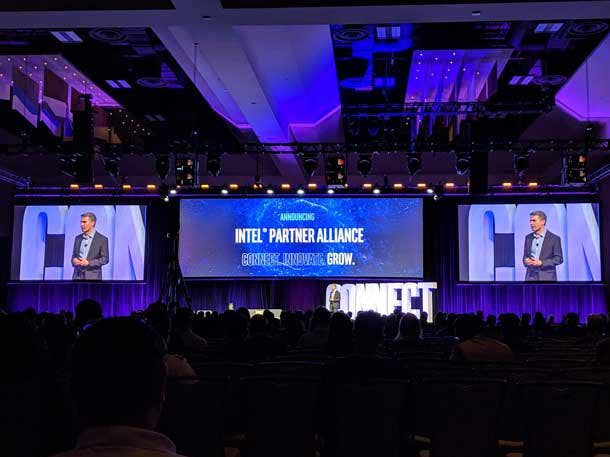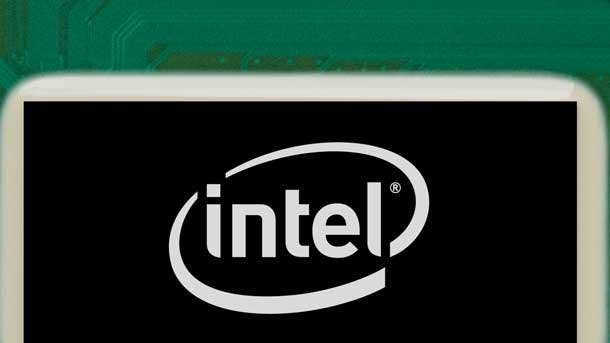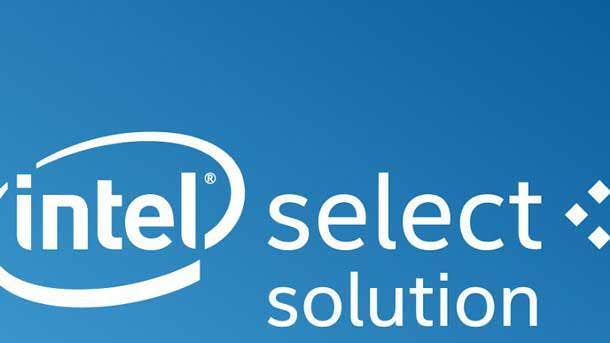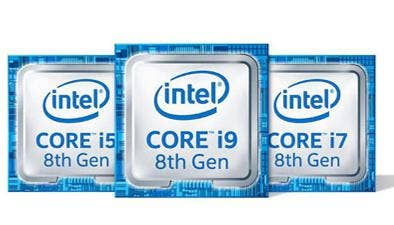Intel Partner Alliance: 6 Program Changes Partners Need To Know
'It's truly an entirely new construct that widens the aperture of the partner ecosystem that we're seeing,' Intel's Eric Thompson tells CRN of the chipmaker's new partner program.

Intel Brings More Partners Together Under New, Consolidated Program
Intel has officially begun its transition to a revamped partner program, Intel Partner Alliance, with this month's launch of its new training portal, Intel Partner University, which aims to equip partners with personalized curricula for technologies and products like IoT and FPGAs.
The Santa Clara, Calif.-based company announced plans to revamp its partner programs at the Intel Partner Connect event in March, but this month, the chipmaker began sharing more details for what partners should expect, including a shakeup of the tier program as well as new ways for partners to identify themselves and collaborate with each other.
[Related: Jason Kimrey: Intel’s Data-Centric Platform Strategy Is A Winning Hand For Partners]
Intel Partner Alliance, which is set to launch in the second half of 2020, will consolidate multiple partner programs under one umbrella, with the goals of simplifying how partners work with Intel, providing more technical resources to a broader partner base and enabling the creation of new solutions.
What follows are the most important changes partners need to know about Intel Partner Alliance, including details for Intel Partner University as well as the forthcoming Intel Solutions Marketplace and how the programs will differ from their predecessors.

Intel Partner Alliance Intros New Tiers, Lifts Points Cap
With Intel Partner Alliance, Intel will consolidate three existing partner programs — Intel Technology Provider, Intel Cloud Insider and Intel IoT Solutions Alliance — into one.
As a result, the company has had to rethink its partner tiers, which were Member, Gold and Platinum under the Intel Technology Provider program, since the new Intel Partner Alliance represents a far broader group of partners, ranging from OEMS and resellers to FPGA designers and manufacturers.
For Intel Partner Alliance, there will be three tiers: Member, Gold and Titanium. Each tier will come with role-specific criteria, meaning that depending on the type of partner, there will be different kinds of requirements for reaching a certain level.
"It's truly an entirely new construct that widens the aperture of the partner ecosystem that we're seeing. It puts that under a single front door for our partners to enter," Eric Thompson, Intel's general manager of global partner enablement, said in an interview with CRN.
With the change in tier model, it's possible that some partners who were on the lower end of the Platinum tier in the Intel Technology Provider program may find themselves in the Gold tier in Intel Partner Alliance, according to Thompson.
However, he said, Intel is lifting the points cap for the Gold tier, among other adjustments, so that the benefits are "essentially equal" and partners don't lose anything they previously had.
"We have always had a value in all of our partners," Thompson said. "We look at Gold as a very valued tier across all these different roles."

Program Allows Partners To Identify By Roles, Specialties
With the broader base of partners represented in the upcoming Intel Partner Alliance, the company is allowing partners to identify by roles and specialties.
Roles are based on business model, and partners can choose one or multiple roles to identify themselves. They include reseller, independent software vendor and system integrator, among others.
"Some partners, especially larger ones, that have complex business models can have multiple roles," Thompson said.
A partner can also assign itself one or more specialties, which include product areas and market segments like FPGAs and artificial intelligence in the data center, respectively. Other specialties include high-performance computing and gaming.
Starting out, Intel Partner Alliance will have nine designated specialties, but that number will expand over time, according to Thompson.
Beyond roles and specialties, Intel Partner Alliance will have new community groups that will organize around different products, solutions and market segments. One of the groups, the IoT Solutions Alliance, is being brought into the fold after previously serving as a standalone Intel program.
While the community groups are expected to attract partners who already specialize in certain areas, like IoT, Thompson said the groups will be open to any partner who is interested.
"We also welcome partners who may […] want to grow in those areas," he said, describing the groups as "a way to generate collaboration across the breadth of partners."

New Partner Initiatives For Targeted Campaigns
One of the other new facets of Intel Partner Alliance will be "initiatives," which are designed to provide partners with tailored investments or benefits to drive specific business outcomes.
Thompson said these initiatives will target specific segments of partners, depending on the opportunity. For example, Intel could provide marketing development funds to a select group of partners based on their role or tier for a product launch over a specified period.
"It's a consistent way to deliver initiatives that are more tailored for the right partner depending on tier or role," Thompson said.
One existing program, CHAMP, or Intel's Channel Authorized Manufacturer Program, is another example of what an initiative could look like, according to Thompson. CHAMP is a program designed to drive matchmaking between ODMs and local OEMs for the purpose of building new systems.
With CHAMP being absorbed into Intel Partner Alliance, Thompson said it would be easier for other kinds of partners to participate in that initiative.

Intel Solutions Marketplace Aims To Drive Collaboration
As one of the pillars of the new Intel Partner Alliance, Intel Solutions Marketplace will seek to increase collaboration among partners and direct customers to partner solutions.
Intel is calling Intel Solutions Marketplace a "B2B digital platform," but it will not facilitate any financial transactions. Instead, the platform, which is set to launch in November, will serve as a way for partners to market their Intel-based solutions to other partners as well as customers.
"Intel will be able to produce leads through our marketing campaigns and direct customers here," Thompson said.
The platform will serve as the successor to Intel Solutions Directory, which has largely been focused on solutions for the IoT and embedded computing segments. But Intel Solutions Marketplace will significantly expand the types of solutions that are featured.
One of the main features of Intel Solutions Marketplace is partner matchmaking, which will allow partners to seek out other partners based on their roles, specialties and solutions.
For example, a cloud service provider can use the platform to seek out an operational technology system integrator to work on an IoT edge solution around factory automation. Before Intel Partner Alliance and Intel Solutions Marketplace, those partners would have been part of separate programs.
"That complexity of solution stitching is only growing in its need and we're seeing that kind of behavior happening," Thompson said.

Intel Partner University Provides Personalized Training
Intel Partner University launched this month as one of the first pillars of Intel Partner Alliance ahead of the unified partner program's launch in late 2020.
The new partner education portal consolidates previously disparate training tools into one interface that recommends courses from a pool of more than 400 based on a partner's role, focus area and type. These courses cover a breadth of technologies and Intel products, ranging from artificial intelligence, IoT and cloud to Intel Optane memory and FPGAs.
Among Intel Partner University's key features is an AI-based recommendation engine, new competencies and badges for Intel products and technology fields and a new streamlined interface that is optimized for mobile devices and makes it easier to access and find content.
To help partners learn about emerging fields like AI and IoT as well as new products such Intel Optane memory and FPGAs, Intel Partner University has new competencies that provide partners with technical curricula containing several courses. When individuals complete a curriculum, they will receive a badge they can share on social media and in marketing materials.
Ashu Ghavi, partner training manager at Intel, said starting in the first quarter of 2020, the training portal will also recommend courses based on the content partners browse and the products they buy. In addition, it has a section for popular courses and courses that have been assigned.
Beyond the new competencies and badges, Intel Partner University will provide a new home for Intel webinars, giving partners an easy way to keep track of upcoming webinars and find old ones. Ghavi said the new training portal will also instantly recognize when partners participate in webinars.

Intel Partner Marketing Studio Gets Revamp
As part of the greater Intel Partner Alliance rollout, Intel Partner Marketing Studio received a revamp earlier this month to make it easier for partners to find marketing materials.
Thompson said the updated Intel Partner Marketing Studio, which launched on Oct. 10, comes with improved searchability and increased resources for a wider variety of partners.
"This will be an example of where we'll have a better platform originally tailored for Intel Technology Provider [that] expands the aperture to more of our partners," he said.
The new marketing portal also comes with more user-friendly campaign materials that partners can customize their names with. In addition, the portal features new sections for bookmarks and downloads to improve navigation.
Thompson said the new features were implemented in response to partner surveys and feedback.